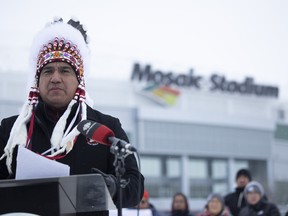Kahkewistahaw First Nation chief said Mosaic has failed to live up to the 'very basic' Indigenous rights engagement
Author of the article: Naimul Karim
Publishing date: Nov 17, 2022 •
REGINA LEADER-POST

Kahkewistahaw First Nation Chief Evan Taypotat speaks
at a press conference outside Mosaic Stadium in Regina.
PHOTO BY KAYLE NEIS/REGINA LEADER-POST
A Saskatchewan First Nation has accused U.S. miner Mosaic Co. of extracting “billions of dollars” worth of potash from its land for decades without providing any “meaningful benefit” to the community.
The chief of the Kahkewistahaw First Nation, situated about 175 kilometres northeast of Regina, said that the community had applied to hundreds of bids for business contracts with Mosaic, but was awarded just one.
“That contract was minimal,” said chief Evan Taypotat. “For the very next one, we bid the same contract with the same amount, and they told us we are too expensive … Mosaic always comes back to us with either bid too high or they won’t tell us why.”
A Mosaic spokesperson denied the allegations and said the company had included 109 bids from the Kahkewistahaw’s steel fabrication facility. “They responded to three and after working closely with them, we did award them work in 2022 in the hopes that this would lead to a … long-lasting relationship,” said Sarah Fedorchuk, Mosaic’s vice president of public affairs.
But Taypotat said that the miner had been extracting billions of dollars for decades “from our land without giving us nothing more than a few free football tickets and little miner donations to our recreation fund a few years back.”
Florida-based Mosaic is one of the world’s leading producers of potash crop nutrients, primarily used in fertilizers to increase crop yield. The company’s North American potash operations in Saskatchewan and New Mexico are responsible for about 34 per cent of its annual production.
Fedorchuk said that Mosaic will pay about $1.2 billion in resource taxes and royalties to the government of Saskatchewan in 2022, which it says is “far and away the most exhaustive resource tax regime in the world” with its global competitors paying 40 per cent less taxes than the Canadian potash producers.
“As far as our other Indigenous engagement efforts go, we have made significant progress on all of our key pillars,” the Mosaic vice president added.
A Saskatchewan First Nation has accused U.S. miner Mosaic Co. of extracting “billions of dollars” worth of potash from its land for decades without providing any “meaningful benefit” to the community.
The chief of the Kahkewistahaw First Nation, situated about 175 kilometres northeast of Regina, said that the community had applied to hundreds of bids for business contracts with Mosaic, but was awarded just one.
“That contract was minimal,” said chief Evan Taypotat. “For the very next one, we bid the same contract with the same amount, and they told us we are too expensive … Mosaic always comes back to us with either bid too high or they won’t tell us why.”
A Mosaic spokesperson denied the allegations and said the company had included 109 bids from the Kahkewistahaw’s steel fabrication facility. “They responded to three and after working closely with them, we did award them work in 2022 in the hopes that this would lead to a … long-lasting relationship,” said Sarah Fedorchuk, Mosaic’s vice president of public affairs.
But Taypotat said that the miner had been extracting billions of dollars for decades “from our land without giving us nothing more than a few free football tickets and little miner donations to our recreation fund a few years back.”
Florida-based Mosaic is one of the world’s leading producers of potash crop nutrients, primarily used in fertilizers to increase crop yield. The company’s North American potash operations in Saskatchewan and New Mexico are responsible for about 34 per cent of its annual production.
Fedorchuk said that Mosaic will pay about $1.2 billion in resource taxes and royalties to the government of Saskatchewan in 2022, which it says is “far and away the most exhaustive resource tax regime in the world” with its global competitors paying 40 per cent less taxes than the Canadian potash producers.
“As far as our other Indigenous engagement efforts go, we have made significant progress on all of our key pillars,” the Mosaic vice president added.
But Taypotat said the company has failed to live up to the “very basic” Indigenous rights engagement. He said that the First Nation was a co-owner of the resource by law and that Mosaic has a “moral and legal responsibility” to share the benefits.
“My message to Mosaic potash is stop lying to the First Nations people of Saskatchewan,” he said.
The chief also criticized the Saskatchewan government for not providing enough support to the First Nations. He said that currently the steel fabrication facility that the community owns has to go to British Columbia to get work contracts.
“That’s how far we gotta go for a fair shake, let alone the potash mine 10 km from our First Nation. And the only reason B.C. gives us a fair shake is because industry has to ask the First Nation in B.C. for business. In Saskatchewan, it’s the opposite, industry is in charge for everything here,” said Taypotat.
He added that the facility was “more than capable of doing much of the metal fabrication work” required by Mosaic’s mines, which would create “good jobs” for its members.
The Saskatchewan government wasn’t immediately available for a comment.
• Email: nkarim@postmedia.com | Twitter: naimonthefield
No comments:
Post a Comment